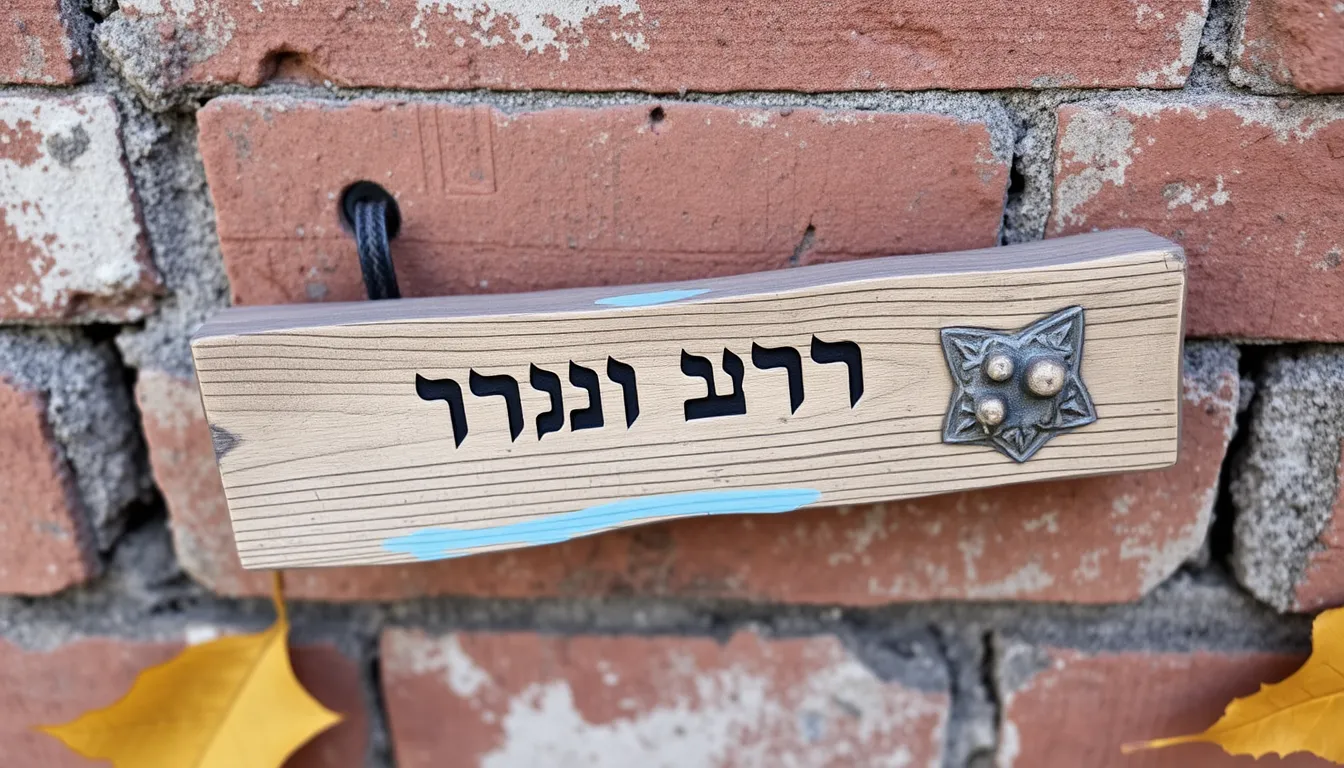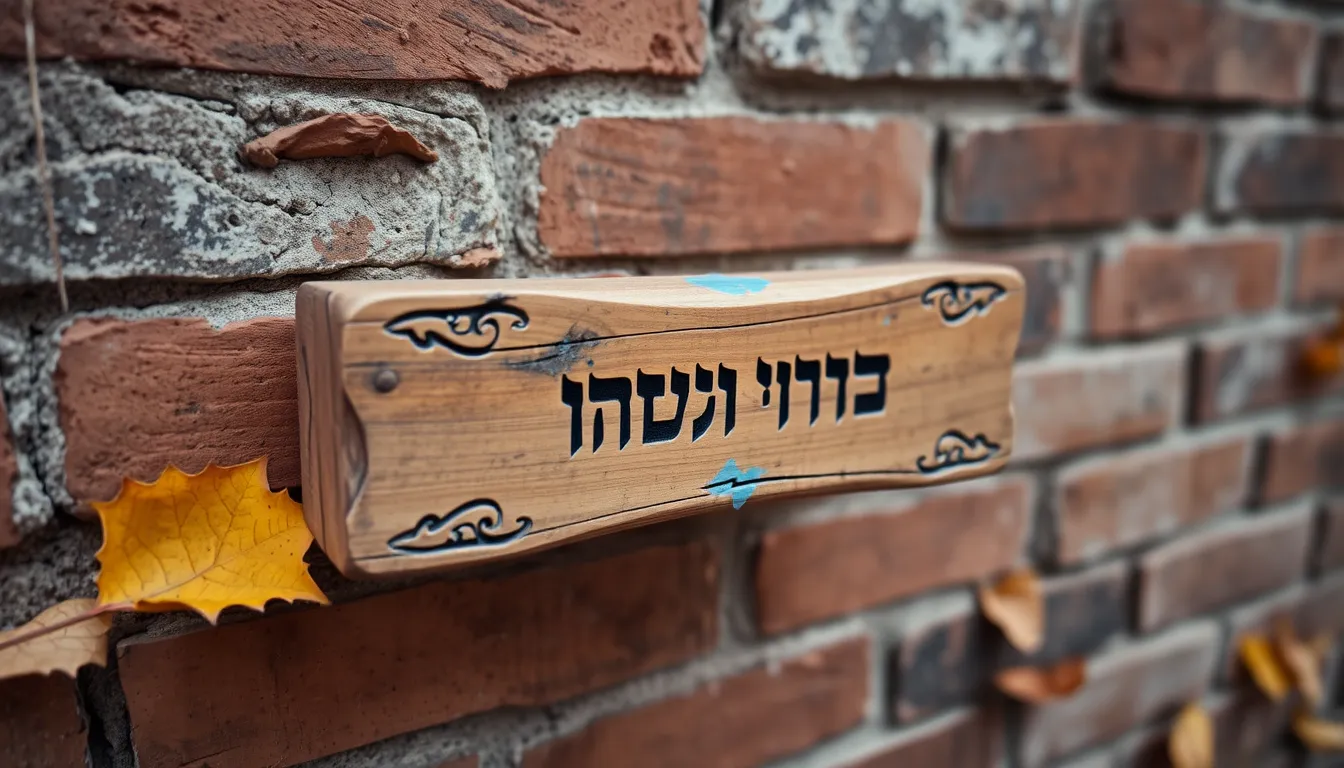Lviv, a city in western Ukraine, is known for its rich tapestry of history, melding various cultural influences through centuries. From its early beginnings as a trading hub in the medieval period to becoming a prominent center of culture and intellect, Lviv’s landscape has been shaped by diverse populations, including the Jewish community that flourished there.
The Jewish presence in Lviv can be traced back to the 14th century, with records indicating a vibrant community engaged in trade, education, and the arts. By the 18th century, the Jewish population had grown significantly, making up a substantial portion of Lviv’s inhabitants. This demographic shift not only enriched the city’s cultural fabric but also established Lviv as an important Jewish center in Eastern Europe.
Throughout its history, the city witnessed various political changes that affected the Jewish community. During the Polish-Lithuanian Commonwealth, Lviv became a significant hub of Jewish intellectual and spiritual life, spawning numerous scholars and institutions. The Haskalah, or Jewish Enlightenment, found a foothold in the city, promoting modern education and cultural engagement within the Jewish population.
In the 20th century, however, Lviv’s Jewish heritage faced tremendous challenges. During World War II, the Nazi occupation led to the decimation of its Jewish community, with most being deported or killed. This dark chapter represents a tragic loss that has significantly impacted the city’s historical narrative, leaving behind a rich yet painful legacy.
After the war, the Jewish presence in Lviv dwindled dramatically, and many historical sites fell into disrepair or were repurposed. Nevertheless, the enduring essence of Lviv’s Jewish heritage continues to resonate through its architecture and surviving cultural landmarks. Today, several initiatives focus on preserving this legacy and revitalizing the Jewish history of the city.
| Period | Significance |
|---|---|
| 14th Century | Establishment of the Jewish community. |
| 18th Century | Intellectual and cultural growth during the Polish-Lithuanian Commonwealth. |
| World War II | Devastating impact on the Jewish population and heritage. |
Today, Lviv’s history is continually reexamined, with a focus on recognizing and honoring its Jewish legacy. The stories of resilience and cultural richness contribute to a broader understanding of the city’s diverse past, showcasing the importance of remembering and preserving Jewish heritage in Lviv.
Significant Jewish Figures
The tapestry of Lviv’s Jewish heritage is interwoven with influential figures who not only shaped their community but also made remarkable contributions to the broader cultural and intellectual spheres. Among these figures, a handful stand out for their trailblazing achievements and enduring legacies.
Isaac Baševis Singer, the Nobel Prize-winning author, is one such luminary who, while not a native of Lviv, had deep familial roots in the surrounding areas. His Jewish heritage profoundly influenced his works, which explored themes of life, faith, and the immigrant experience. Singer’s poignant storytelling resonates with those familiar with Lviv’s own historical narrative of adaptation and resilience, capturing the essence of a community that faced both oppression and cultural richness.
Another celebrated figure is Yehuda Leib Maimon, an influential politician and Zionist leader born in Lviv. Maimon dedicated his life to the development of Jewish national identity and education. He played a critical role in the establishment of the Hebrew National Fund and worked tirelessly to promote Jewish settlement in Palestine. His contributions were pivotal in uniting various Jewish movements and fostering a sense of purpose among the Jewish diaspora, connecting them back to their heritage.
Shlomo Katz, a prominent Jewish educator and community leader in the early 20th century, left an indelible mark on Lviv’s Jewish educational landscape. As the principal of the local Jewish school, Katz implemented progressive educational reforms, emphasizing the importance of a modern curriculum intertwined with Jewish thought. His vision inspired a generation of scholars and activists who went on to invigorate the Jewish community throughout the region.
Additionally, the renowned Aharon Appelfeld, an acclaimed writer and Holocaust survivor with roots in the region, often reflected on the pain and beauty of Jewish life in Lviv. His literary works serve as a haunting reminder of the culture that existed before the devastation of war, capturing the spirit of a community that thrived in art and philosophy.
The impact of these figures can be seen in the numerous cultural institutions and memorials scattered throughout Lviv. Their lives and contributions are not just historical footnotes but rather vibrant threads in the fabric of Lviv’s Jewish heritage, reminding current and future generations of the city’s rich history.
“The greats of the past are not just our memories but our living legacy.” – An ethos shared by many in Lviv’s Jewish community.
As visitors explore the streets of Lviv, they can encounter various locations that honor these significant figures, including museums and cultural institutions dedicated to preserving Jewish history. These places serve as testaments to the vibrant intellectual and spiritual life once pulsating through the Jewish community of Lviv, echoing the stories of those who shaped its past.
Architectural Landmarks
Lviv is home to several striking architectural landmarks that serve as poignant reminders of its rich Jewish heritage. These sites reflect the historical significance and cultural vibrancy of the Jewish community that once thrived in the city. Each landmark carries its own story, intricately woven into the larger narrative of Lviv’s past.
A notable example is the Great Suburban Synagogue, located in the heart of Lviv. Built in the late 19th century, this magnificent structure exemplifies the Neo-Renaissance style, characterized by its grandiose façade and stunning stained glass. The synagogue was a central place of worship and community gathering for Lviv’s Jewish population, serving as a beacon of spiritual and cultural life. Although it suffered damage during World War II, restoration efforts have allowed visitors to appreciate its architectural beauty and historical importance.
Another important site is the Golden Rose Synagogue, which dates back to the 16th century, making it one of the oldest synagogues in Lviv. Though it was destroyed during the Nazi occupation, remnants of its original structure have been preserved, offering a glimpse into the past. The site highlights the significant role that synagogues played not only as religious sites but also as cultural hubs within the Jewish community.
| Landmark | Year Established | Architectural Style | Current Status |
|---|---|---|---|
| Great Suburban Synagogue | Late 19th Century | Neo-Renaissance | Restored |
| Golden Rose Synagogue | 16th Century | N/A | In Ruins |
The Jewish Cemetery on Zamarstynivska Street offers another powerful testament to Lviv’s Jewish history. Established in the late 15th century, it is one of the oldest Jewish cemeteries in Ukraine and provides insight into the lives of the city’s Jewish inhabitants over the centuries. The cemetery features ornate tombstones, many inscribed with Hebrew epitaphs, reflecting the art and culture of the ecclesiastical Jewish life during various periods. For visitors, walking through this solemn yet beautiful site evokes a sense of reverence for the community that once flourished in Lviv.
Furthermore, the Beit Knesset HaKhalutzim, or the Union of Jewish Workers, stands as a significant cultural landmark. Established in the early 20th century, it served not only as a place of worship but also as a cultural center for the Jewish labor movement. Today, it is an important historical site commemorating the contributions of Jewish workers and intellectuals who were essential to Lviv’s burgeoning social fabric.
These architectural gems, while often overshadowed by modern developments, remind today’s visitors of the profound impact the Jewish community has had on the city. Each structure tells a story of resilience and creativity, urging exploration and appreciation for Lviv’s enduring Jewish heritage.
Cultural Contributions

Lviv’s Jewish community has not only left a mark on the city’s architectural landscape but has also made substantial cultural contributions that resonate through literature, theatre, music, and the arts. The cultural influence of Jews in Lviv during its height can be seen as a dynamic interplay of tradition and modernity, a fusion that enriched the city’s artistic tapestry.
One of the most prominent cultural contributions came from the realm of literature. Lviv became a notable hub for Jewish writers and publishers, especially in the late 19th and early 20th centuries. The Yiddish literary movement in Lviv was particularly vibrant, with many authors producing works that reflected the struggles and aspirations of Jewish life. Literary figures such as Sholem Aleichem routinely visited Lviv, and their influence contributed to the proliferation of Yiddish literature. Many magazines and periodicals flourished here, paving the way for future generations of writers who would draw inspiration from the city’s rich cultural heritage.
Theatre also played a crucial role in expressing and preserving Jewish cultural identity in Lviv. The city was home to a variety of Yiddish theatres, including the famous Yiddish Theatre of Lviv, which showcased performances that highlighted both contemporary issues and age-old traditions. These theatrical expressions provided a platform for artists to evoke themes of heritage, identity, and resilience, fostering a sense of unity within the community. The plays often tackled complex topics, from assimilation to the struggles of Jewish life, making a lasting impact on audiences and reflecting the challenges faced by the community.
In the realm of music, Lviv’s Jewish community contributed significantly to the Eastern European klezmer tradition. Klezmer bands often performed at weddings and public celebrations, bringing joy through lively tunes that blended Yiddish folk with local Ukrainian melodies. Many talented musicians emerged from Lviv, contributing to a musical legacy that celebrates Jewish culture. The annual Klezfest, a festival dedicated to klezmer music, underscores Lviv’s ongoing connection to its Jewish roots, attracting musicians and enthusiasts from around the world.
The visual arts also flourished, with Lviv providing a fertile ground for Jewish artists. The city became an artistic sanctuary for several renowned painters and sculptors who incorporated themes of Jewish life into their work. Galleries and exhibitions often featured Jewish-themed art, celebrating the community’s contributions while preserving its narrative. The vibrancy of Jewish cultural expression in Lviv is also reflected in the various murals and public artworks that celebrate Jewish history and commemorate renowned figures from the community.
The ongoing efforts to revive and sustain Jewish cultural expressions in Lviv emphasize the dynamic legacy of its Jewish heritage. Several institutions now offer classes in Yiddish language, klezmer music, and Jewish art, ensuring that this rich cultural tapestry continues to be experienced by future generations. Through both traditional and contemporary formats, Lviv remains a beacon of Jewish creativity, reflecting the community’s resilience against adversity and its ability to enrich the broader cultural landscape.
“Culture is the heartbeat of a community, and for Lviv’s Jews, it pulsates through every song, story, and celebration.” – A sentiment echoed by cultural advocates in Lviv.
Memorials and Remembrance
Throughout Lviv, memorials and sites of remembrance serve as poignant reminders of the city’s once-thriving Jewish community and the catastrophic events that befell it during the Holocaust. These memorials not only honor the memory of the lost but also play an integral role in educating future generations about the importance of preserving Jewish heritage and history.
One of the most significant sites is the Yad Vashem Holocaust Memorial, which stands as a solemn tribute to the victims of the Holocaust from Lviv and the surrounding areas. Symbolizing hope and resilience, this memorial features a series of sculptures and inscriptions that reflect the pain and suffering endured by the Jewish population during the Nazi occupation. Visitors often pause in front of the memorial to absorb its powerful message, contemplating the lessons learned from this dark period in history.
The Jewish Cemetery on Zamarstynivska Street is another crucial location for remembrance. This site is the final resting place for many notable Jewish figures from Lviv’s past, with centuries-old gravestones that tell individual stories. Walking through the cemetery evokes a sense of solemnity and respect as visitors reflect on the lives of those buried there. Preservation efforts have been made to restore many of the gravestones, allowing for a deeper connection to Lviv’s Jewish history.
Another noteworthy site is the Memorial to the Victims of the Lviv Ghetto, which commemorates the thousands of Jews who were forced into the ghetto established by the Nazis during World War II. A detailed bronze plaque details the history of the ghetto and honors the resilience of those who suffered and perished. This memorial serves not only as a reminder of the atrocities committed but also as a call to action for contemporary society to resist intolerance and hatred.
| Memorial/Site | Description | Significance |
|---|---|---|
| Yad Vashem Holocaust Memorial | A memorial dedicated to the victims of the Holocaust from Lviv. | Honors and educates about the experiences of Jewish people during World War II. |
| Jewish Cemetery on Zamarstynivska Street | Final resting place for many Jewish figures and community members. | Preserves individual stories and the history of Jewish life in Lviv. |
| Memorial to the Victims of the Lviv Ghetto | Commemorates the Jews who suffered in the Lviv Ghetto. | Acts as a stark reminder of the impact of the Holocaust and promotes tolerance. |
Furthermore, the Lviv Jewish Community Center plays a crucial role in maintaining and promoting Jewish culture and memory in modern day Lviv. It not only serves as a hub for educational programs and cultural events but also hosts commemorative ceremonies that connect the past with the present. The center encourages community engagement and cultural revival, offering art exhibitions, lectures, and performances aimed at celebrating Lviv’s Jewish heritage.
Commemorative gatherings also take place annually on significant dates, such as Holocaust Remembrance Day. These events draw community members and visitors alike, providing a space for collective mourning and remembrance. Such activities promote awareness of Lviv’s Jewish history while fostering conversations about identity, resilience, and the continuous fight against anti-Semitism.
“To remember is to ensure that the lives lost are not forgotten, and the lessons of history are passed down.” – Voices from Lviv’s Jewish community.
The commitment to remembering the past is evident in the efforts undertaken by various organizations, which strive to ensure that the Jewish stories of Lviv remain alive for future generations. In this way, the memorials and places of remembrance not only honor those who came before but also serve as vital educational tools in understanding the complexities of Lviv’s Jewish heritage and identity.
Exploring Contemporary Jewish Life
The contemporary Jewish community in Lviv, though reduced in size from its pre-war population, is vibrant and actively engaged in preserving and promoting Jewish heritage. In recent years, there has been a resurgence of interest in Jewish culture, with various initiatives aimed at reviving the traditions and history that once flourished in the city.
The Lviv Jewish Community Center plays a pivotal role as a cultural hub, offering a range of programs and activities that celebrate Jewish heritage. From educational workshops to social gatherings, the center fosters a sense of belonging and community among both younger and older generations. Regular events such as Shabbat dinners, holiday celebrations, and cultural festivals create opportunities for community members to connect, share experiences, and keep traditions alive.
In addition to the community center, Lviv hosts several Jewish cultural events throughout the year. One highlight is the annual Lviv Jewish Cultural Festival, which showcases films, music, art, and literature that celebrate Jewish culture. This festival attracts not just local participants but also visitors from around the world, eager to explore the city’s rich Jewish history and contemporary expressions of that heritage.
Another noteworthy initiative is the Yiddish Language Revival Project, which aims to teach Yiddish to new generations. Classes are held at various community centers, allowing participants to learn the language’s nuances while exploring its cultural significance. This effort is crucial for maintaining a connection to the past and ensuring that the traditions associated with Yiddish culture do not fade away.
Art also plays a significant role in contemporary Jewish life in Lviv. The city’s vibrant art scene includes works by Jewish artists who reflect on their community’s history and identity. Galleries often feature exhibitions that tackle themes of Jewish memory and resilience, inviting visitors to engage with the stories behind the art. One example is the ongoing project to create public art installations that commemorate Lviv’s Jewish heritage, weaving narratives of the past into the urban landscape.
As Lviv continues to evolve, there is an increasing focus on interfaith dialogue and cooperation. The city’s diverse population observes various religious and cultural practices, and initiatives aimed at fostering communication and mutual understanding are gaining traction. Events that bring together Jewish, Ukrainian, and other communities highlight shared history and promote a spirit of unity, aimed at overcoming the divisions that have marked the region’s past.
“Lviv’s Jewish community is not just a remnant of history; it is an active part of our city’s present and future.” – A sentiment echoed by community leaders.
Moreover, educational programs are being implemented in schools to teach students about the importance of Jewish history in Lviv. Workshops and lectures led by historians and community activists foster a greater understanding among young people about the rich cultural legacy that is part of their city’s identity. The inclusion of Jewish history in educational curriculums is essential for combating prejudice and promoting tolerance.
Visits to the Jewish sites in Lviv, such as the Jewish Cemetery and restored synagogues, have also become part of the city’s cultural tourism movement. Guided tours often include not only explanations of the sites’ historical significance but also personal stories that illustrate the interwoven relationships between communities throughout Lviv’s history. These initiatives reflect a growing acknowledgment within Lviv of the importance of Jewish heritage to the broader narrative of the city’s past.
Through these various efforts and programs, the contemporary Jewish community in Lviv is not only preserving its heritage but also contributing actively to the city’s cultural landscape. With resilience and creativity, Lviv’s Jews continue to celebrate their identity while reaching out to engage with the wider community, ensuring that their history remains a vibrant part of the city’s narrative.


